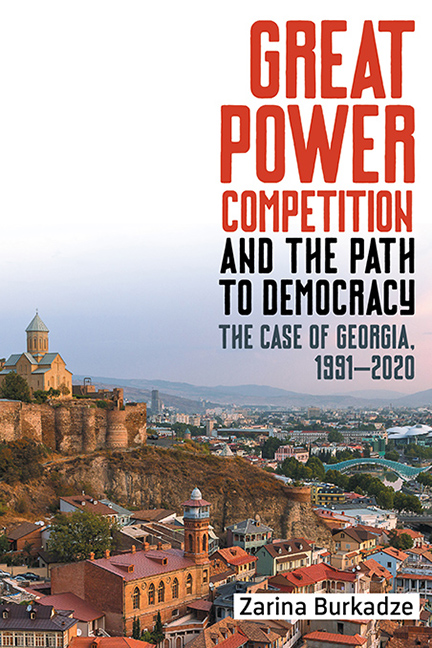Book contents
- Frontmatter
- Contents
- Preface
- List of Acronyms and Abbreviations
- Introduction: The Puzzle of Georgian Democratization
- 1 Autocracy and Democracy in Georgia: What Made the Difference?
- 2 Democratization without Great Power Competition, 1991–1993
- 3 Pluralizing Geopolitical Space, 1993–2003
- 4 The Dictatorship of Democrats, 2003–2012
- 5 Democratic Arrival? 2012–2020
- 6 Democracies In-Between
- Conclusion
- Appendix: List of Interviews
- Bibliography
- Index
Conclusion
Published online by Cambridge University Press: 16 July 2022
- Frontmatter
- Contents
- Preface
- List of Acronyms and Abbreviations
- Introduction: The Puzzle of Georgian Democratization
- 1 Autocracy and Democracy in Georgia: What Made the Difference?
- 2 Democratization without Great Power Competition, 1991–1993
- 3 Pluralizing Geopolitical Space, 1993–2003
- 4 The Dictatorship of Democrats, 2003–2012
- 5 Democratic Arrival? 2012–2020
- 6 Democracies In-Between
- Conclusion
- Appendix: List of Interviews
- Bibliography
- Index
Summary
As a citizen of democratizing Georgia, I asked myself why democracy promotion leads to unintended consequences. Despite their shared political history, the Baltic states consolidated around democracy after Soviet dissolution, while Georgia and its South Caucasian counterparts lagged behind. Some scholars believe that the path dependence explains successful democratic outcomes, which means that countries with a history of democratic institutions are the most likely to be successful in building democracies. Despite postauthoritarian institutions, the countries of central and eastern Europe did this. EU and NATO membership, as well as democracy promotion by the United States, offers explanations for the success of democratization efforts in these countries. In the 2000s, the diffusion of color revolutions changed authoritarian regimes. However, the revolutions were successful in limited geographic areas and did not produce the kind of democracy people demanded during the demonstrations. In my investigation, I found that the choices of the political elites helped explain these mixed outcomes in ways that previous scholarship has overlooked. Since 2002, Russia and China have gradually returned to international politics, the mechanisms of autocracy promotion accounted for many of the failed cases of democratization because the promotion of authoritarianism worldwide took weakened consolidated democracies and reversed the processes of democratization.
In this book, I have searched for answers about the unintended consequences of external involvement in the process of democratization. Why and how did democracy emerge in Georgia while it was the target of intense great power competition between the West and Russia? How and under which circumstances does external political competition lead to democracy? How do these factors influence institutions and actors? The case study of Georgia, along with the cross-case comparisons with Armenia, Azerbaijan, Moldova, and Ukraine, provides evidence for a few answers. The first and most significant conclusion I have come to is that external political competition can lead to democracy when it builds opposing political forces within a polity. Externally backed competition can pluralize a nation's political landscape as actors engage in domestic competition within a democratic framework. External competition also creates multiple pressure groups that can limit governmental powers and force rulers to be more responsive.
- Type
- Chapter
- Information
- Great Power Competition and the Path to DemocracyThe Case of Georgia, 1991-2020, pp. 159 - 170Publisher: Boydell & BrewerPrint publication year: 2022

